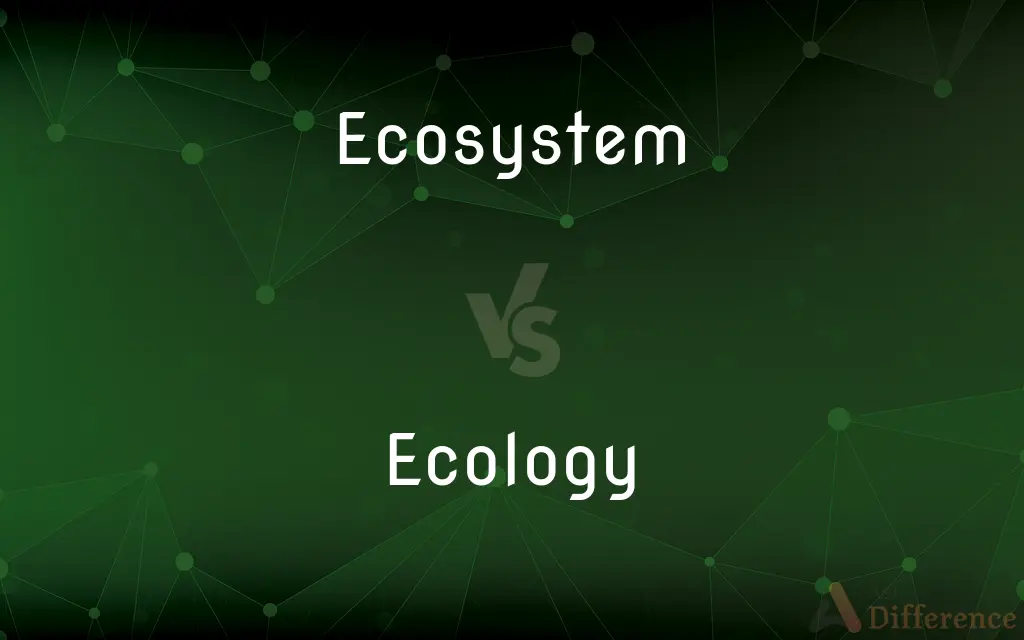Ecosystem vs. Ecology — What's the Difference?
Edited by Tayyaba Rehman — By Urooj Arif — Updated on March 14, 2024
Ecosystem refers to a community of living organisms and their physical environment, while ecology is the study of interactions among organisms and their environment.

Difference Between Ecosystem and Ecology
Table of Contents
ADVERTISEMENT
Key Differences
Ecosystem encompasses both the biotic (living organisms) and abiotic (non-living elements like water, air, and soil) components of an environment and their interactions. Ecology, on the other hand, is the scientific discipline that examines how organisms interact with each other and with their physical surroundings.
While an ecosystem can be observed and studied as a specific, tangible entity, such as a forest, a coral reef, or a desert, ecology is an overarching field of study that employs various scientific methods to understand the principles governing these interactions.
Ecosystems are characterized by energy flows and nutrient cycles, which help maintain the functioning and stability of the system. Ecology delves deeper into these processes, exploring the underlying mechanisms, relationships, and dynamics that enable ecosystems to sustain life.
The concept of an ecosystem can be applied at multiple scales, from a small pond to the entire biosphere, and is used to understand the complex web of life in a particular locale. Ecology, while it includes the study of ecosystems, also encompasses broader topics such as biodiversity, population dynamics, and environmental conservation.
Ecosystem management and conservation efforts often stem from ecological studies, which provide insights into how human activities impact natural systems and how best to preserve ecological balance. Ecology, by providing a foundation of scientific knowledge, informs strategies for the sustainable management of ecosystems.
ADVERTISEMENT
Comparison Chart
Definition
A community of living organisms and their physical environment
The study of interactions among organisms and their environment
Focus
Specific environments and their inhabitants
Interactions and principles governing living organisms and their environments
Scope
Can be observed as tangible entities (forests, reefs, etc.)
Broad scientific field encompassing various ecosystems and interactions
Characterization
Energy flows and nutrient cycles
Biodiversity, population dynamics, environmental conservation
Application
Understanding life in specific locales
Informing ecosystem management and conservation
Compare with Definitions
Ecosystem
Comprises living and non-living components.
A rainforest ecosystem includes trees, animals, insects, and the humid atmosphere.
Ecology
Studies the relationships between organisms and their environment.
Marine ecology examines how oceanic life forms interact with marine environments.
Ecosystem
Characterized by specific energy flows.
In a marine ecosystem, energy flows from phytoplankton to apex predators.
Ecology
Addresses biodiversity and species interactions.
Ecology explores how biodiversity contributes to the resilience of ecosystems.
Ecosystem
Can vary in size and complexity.
A micro-ecosystem might exist in a small pond.
Ecology
Employs scientific methods for understanding.
Ecologists use field studies and modeling to understand predator-prey dynamics.
Ecosystem
Affected by external and internal factors.
Climate change impacts the balance of polar ecosystems.
Ecology
Informs conservation strategies.
Ecological research helps design effective conservation programs.
Ecosystem
Maintains balance through nutrient cycles.
Decomposers in a forest ecosystem recycle nutrients.
Ecology
Considers the impact of human activities.
Urban ecology studies how cities influence and are influenced by natural processes.
Ecosystem
An ecosystem (or ecological system) consists of all the organisms and the physical environment with which they interact. These biotic and abiotic components are linked together through nutrient cycles and energy flows.
Ecology
Ecology (from Greek: οἶκος, "house" and -λογία, "study of") is the study of the relationships between living organisms, including humans, and their physical environment [1], [2]. Ecology considers organisms at the individual, population, community, ecosystems, and biosphere level.
Ecosystem
An ecological community together with its environment, functioning as a unit.
Ecology
The science of the relationships between organisms and their environments.
Ecosystem
A system formed by an ecological community and its environment that functions as a unit.
Ecology
The relationship between organisms and their environment.
Ecosystem
The interconnectedness of organisms (plants, animals, microbes) with each other and their environment.
Ecology
See human ecology.
Ecosystem
(by extension) A network of interconnected people or organisations that resembles a natural ecosystem due to the complex interdependencies.
The company’s ecosystem mainly comprises its supply chain, customers, end consumers and competitors.
Ecology
(biology) The branch of biology dealing with the relationships of organisms with their environment and with each other.
Ecosystem
A system formed by the interaction of a community of organisms with their physical environment
Ecology
The branch of biology concerned with the various relations of animals and plants to one another and to their surrounding environment.
Ecology
The environment as it relates to living organisms;
It changed the ecology of the island
Ecology
The branch of biology concerned with the relations between organisms and their environment
Common Curiosities
How do ecological studies contribute to environmental conservation?
Ecological studies provide insights into how ecosystems function, how human activities affect them, and how to mitigate negative impacts, guiding conservation efforts.
Is ecology only concerned with natural environments?
While ecology often focuses on natural environments, it also studies urban and artificial environments to understand the interactions between humans and nature.
Are all ecosystems part of a larger ecosystem?
Yes, individual ecosystems are interconnected and can be considered part of larger ecosystems, ultimately contributing to the biosphere, which encompasses all life on Earth.
Can ecology help in addressing climate change?
Ecology can offer valuable insights into the effects of climate change on ecosystems and suggest sustainable practices to mitigate its impact.
Is biodiversity a component of an ecosystem or a study within ecology?
Biodiversity is a component of ecosystems, referring to the variety of life within them, and is also a key subject of study within ecology.
Can an ecosystem function without any living organisms?
No, living organisms are a fundamental component of ecosystems, contributing to energy flows and nutrient cycles.
How do ecologists study ecosystems?
Ecologists use various methods, including field observations, experiments, and mathematical models, to study ecosystems and the interactions within them.
What role do abiotic factors play in an ecosystem?
Abiotic factors, such as climate, soil, and water, significantly influence the structure and function of ecosystems by affecting living organisms' survival and interactions.
How do ecosystems adapt to environmental changes?
Ecosystems adapt through changes in species composition, behavior, and genetic adaptations of organisms, often influenced by natural selection.
What challenges do ecologists face in studying ecosystems?
Challenges include the complexity and variability of natural systems, the long-term nature of ecological processes, and the impact of human activities.
How does energy flow in an ecosystem?
Energy flows through an ecosystem in a one-way stream, from primary producers (like plants) to various levels of consumers and finally to decomposers.
What is the significance of nutrient cycles in ecosystems?
Nutrient cycles, such as the carbon and nitrogen cycles, are crucial for recycling essential elements, supporting life, and maintaining ecosystem health.
How does the scale of observation affect the study of ecosystems and ecology?
The scale of observation, from micro-ecosystems to the global biosphere, affects the complexity of interactions studied and the insights gained in both ecosystems and ecology.
What is the role of humans in ecosystems and ecology?
Humans are integral parts of many ecosystems and significantly influence ecological processes, both positively and negatively, through activities like agriculture, urbanization, and conservation.
Can man-made environments be considered ecosystems?
Yes, man-made environments like cities can be considered ecosystems, as they contain living organisms (including humans) interacting with their physical environment.
Share Your Discovery

Previous Comparison
Surprise vs. Shock
Next Comparison
Alimony vs. MaintenanceAuthor Spotlight
Written by
Urooj ArifUrooj is a skilled content writer at Ask Difference, known for her exceptional ability to simplify complex topics into engaging and informative content. With a passion for research and a flair for clear, concise writing, she consistently delivers articles that resonate with our diverse audience.
Edited by
Tayyaba RehmanTayyaba Rehman is a distinguished writer, currently serving as a primary contributor to askdifference.com. As a researcher in semantics and etymology, Tayyaba's passion for the complexity of languages and their distinctions has found a perfect home on the platform. Tayyaba delves into the intricacies of language, distinguishing between commonly confused words and phrases, thereby providing clarity for readers worldwide.













































